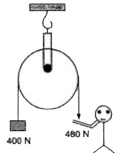Can the efficiency be greater than 100% ? Justify
To determine if the efficiency can be greater than 100%, we need to understand the concept of efficiency in the context of energy conservation.
1. Definition of Efficiency:
Efficiency is defined as the ratio of useful output power to the input power, usually expressed as a percentage. Mathematically, it can be represented as:
Efficiency=(Output PowerInput Power)×100%
2. Understanding Input and Output Power:
- Input power is the energy supplied to a system (e.g., 100 joules).
- Output power is the useful energy obtained from the system after conversion (e.g., 110 joules).
3. Hypothetical Scenario:
Let's assume we have an input power of 100 joules. If the output power were to be 110 joules, we can calculate the efficiency:
Efficiency=(110 joules100 joules)×100%=110%
4. Energy Conservation Principle:
According to the law of conservation of energy, energy cannot be created or destroyed; it can only be transformed from one form to another. This means that the output power cannot exceed the input power.
5. Conclusion:
Since our hypothetical scenario results in an efficiency greater than 100%, it leads to a violation of the conservation of energy principle. Therefore, it is impossible for efficiency to exceed 100%.
Thus, the answer to the question is no, the efficiency cannot be greater than 100%.
Efficiency is defined as the ratio of useful output power to the input power, usually expressed as a percentage. Mathematically, it can be represented as:
Efficiency=(Output PowerInput Power)×100%
- Input power is the energy supplied to a system (e.g., 100 joules).
- Output power is the useful energy obtained from the system after conversion (e.g., 110 joules).
Let's assume we have an input power of 100 joules. If the output power were to be 110 joules, we can calculate the efficiency:
Efficiency=(110 joules100 joules)×100%=110%
According to the law of conservation of energy, energy cannot be created or destroyed; it can only be transformed from one form to another. This means that the output power cannot exceed the input power.
Since our hypothetical scenario results in an efficiency greater than 100%, it leads to a violation of the conservation of energy principle. Therefore, it is impossible for efficiency to exceed 100%.
Topper's Solved these Questions
- HEAT AND MECHANICAL ENERGYBOOK - CENGAGE PHYSICSCHAPTER - HEAT AND MECHANICAL ENERGYEXERCISE - Mandatory exercise (Exercise Set II)
6 Videos
- HEAT AND MECHANICAL ENERGYBOOK - CENGAGE PHYSICSCHAPTER - HEAT AND MECHANICAL ENERGYEXERCISE - Mandatory exercise (Exercise Set III)
5 Videos
- HEAT AND MECHANICAL ENERGYBOOK - CENGAGE PHYSICSCHAPTER - HEAT AND MECHANICAL ENERGYEXERCISE - Olympiad and NTSE Level Exercises
7 Videos
- ELECTROMAGNETIC SPECTRUM AND RADIATIONSBOOK - CENGAGE PHYSICSCHAPTER - ELECTROMAGNETIC SPECTRUM AND RADIATIONSEXERCISE - Olympiad And NTSE Level Exercises
10 Videos
- HEAT AND TEMPERATURE BOOK - CENGAGE PHYSICSCHAPTER - HEAT AND TEMPERATURE EXERCISE - OLYMPIAD AND NTSE LEVEL EXERCISES
10 Videos
Similar Questions
Knowledge Check
Efficiency of Carnot engine is 100% if
AT2=273KBT2=0KCT1=273KDT1=0K
Can the experimental probabilty of an event be greater than 1? Justify your answer.
View SolutionNo real engine can have an efficiency greater than that of a carnot engine working between the same two temperatures, why?
View SolutionAnswer true or false:
If the efficiency of a machine is 100%, the mechanical advantage equals the velocity ratio.
View SolutionOrganisms can live in pressure greater than 100 times the normal pressure.
View SolutionIn an actual machine VR is always more than MA. The efficiency of a practical machine is less than 100%. Justify the above with reason.
View SolutionUnder what ideal condition the efficiency of a Carnot engine be 100%.
View SolutionThe diagram shows a fixed pulley used by a boy to lift a load of 400 N through a vertical height of 5 m is 10 s. The effort applied by the boy on the other end of the rope is 480 N.

(a) What is the velocity ratio of the pulley ?
(b) What is the mechanical advantage?
(c) Calculate the efficiency of the pulley.
(d) Why is the efficiency of the pulley not 100%?
(e) The boy has to apply an effort which is greater than the load he is lifting. What is the justification for using the pulley?
View Solution
